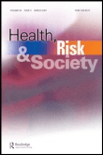
HEALTH RISK & SOCIETY
Scope & Guideline
Navigating the Landscape of Health Risks and Society
Introduction
Aims and Scopes
- Interdisciplinary Analysis of Health Risks:
The journal emphasizes an interdisciplinary approach to understanding health risks, integrating perspectives from sociology, psychology, public health, and policy studies. - Risk Perception and Communication:
A significant focus is placed on how risks are perceived by different populations and how this affects individual and collective health behaviors. - Cultural and Social Contexts of Health:
Research often explores how cultural, social, and economic contexts shape understandings of health risks and influence health-related decisions. - Impact of Policy and Governance:
The journal investigates the role of health policies and governance structures in managing health risks, especially in the context of public health crises. - Vulnerability and Inequality:
Attention is given to how health risks disproportionately affect marginalized groups, examining the intersection of risk with issues of inequality and social justice.
Trending and Emerging
- COVID-19 and Health Risk Governance:
The COVID-19 pandemic has catalyzed a surge in research addressing health risk governance, highlighting the complexities of managing health risks in real-time and the importance of trust in public health communication. - Intersectionality in Health Risks:
Emerging studies increasingly focus on intersectional approaches to health risks, examining how overlapping social identities (e.g., race, gender, class) influence health outcomes and risk perceptions. - Participatory Health Promotion:
There is a growing emphasis on participatory approaches to health promotion, actively involving communities in the design and implementation of health interventions. - Mental Health and Risk Management:
Research exploring mental health in the context of risk and uncertainty is gaining traction, reflecting a broader recognition of mental well-being as integral to health risk management. - Narratives and Storytelling in Risk Communication:
The use of narratives and storytelling to convey health risks is emerging as a significant theme, highlighting the power of personal stories in shaping public understanding and engagement with health issues.
Declining or Waning
- Traditional Risk Assessment Models:
There has been a noticeable shift away from conventional risk assessment models that rely heavily on quantitative data, towards more qualitative and contextual approaches that consider lived experiences and social dynamics. - Individualized Risk Narratives:
Research focusing solely on individualized narratives of risk without considering broader societal influences has become less prevalent, indicating a move towards more collective and systemic understandings of health risks. - Static Risk Communication Strategies:
Static approaches to risk communication that do not adapt to varying social contexts or audience needs are appearing less frequently, as the journal increasingly emphasizes dynamic and participatory communication methods. - Conventional Biomedical Perspectives:
There is a waning interest in purely biomedical perspectives on health risks, with a growing preference for sociocultural analyses that contextualize health within broader societal frameworks. - Single-Dimensional Studies:
Research that examines health risks in isolation, without considering the interplay of multiple factors, is declining, as there is a push for more holistic and integrative studies.
Similar Journals
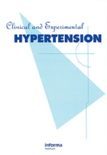
CLINICAL AND EXPERIMENTAL HYPERTENSION
Innovating treatment strategies for hypertension.Clinical and Experimental Hypertension, published by Taylor & Francis Inc, is a crucial resource in the fields of internal medicine and physiology. With its inaugural publication dating back to 1978, this esteemed journal has successfully merged decades of research, providing a platform for the latest advancements in hypertension studies. Operating without an open access model, it is configured to serve a specialized audience of researchers, clinicians, and students who are dedicated to exploring innovative treatment modalities and understanding the complexities of hypertensive diseases. Ranked in the Q3 category in both Internal Medicine and Physiology, this journal accomplishes a commendable standing in the academic community, exemplified by its Scopus rankings which position it within the median percentile range in its field. By disseminating high-quality research and fostering scientific dialogue, Clinical and Experimental Hypertension plays a pivotal role in shaping contemporary understanding and clinical practices concerning hypertension management.

International Maritime Health
Connecting Global Insights in Maritime HealthInternational Maritime Health is a distinguished, open-access journal published by VIA MEDICA that has been pivotal in disseminating research related to maritime health since its inception in 1999. With an ISSN of 1641-9251 and an E-ISSN of 2081-3252, the journal focuses on various aspects of Infectious Diseases, Medicine, and Public Health, making significant contributions to environmental and occupational health, particularly in maritime contexts. As of 2023, it enjoys a Q3 ranking in prominent categories, highlighting its relevance and impact in the field, supported by Scopus ranking that places it competitively within its domains. Open access since 2005, International Maritime Health provides researchers, professionals, and students vital resources to understand and tackle health challenges faced in maritime environments, facilitating the exchange of knowledge that is crucial for enhancing health outcomes in this unique sector. The journal is based in Gdansk, Poland, emphasizing its global outreach and commitment to addressing maritime health issues.

International Journal of Occupational Medicine and Environmental Health
Innovating solutions for healthier workplaces and environments.The International Journal of Occupational Medicine and Environmental Health is a distinguished journal dedicated to advancing the fields of occupational medicine and environmental health. Published by NOFER Institute of Occupational Medicine in Poland, this open-access journal has been providing a platform for innovative research since 2011. With an ISSN of 1232-1087 and an E-ISSN of 1896-494X, it allows for wide dissemination of findings that address contemporary challenges in public health, occupational settings, and environmental issues. The journal has established itself as a vital resource, achieving a Q3 ranking in both Medicine (miscellaneous) and Public Health, Environmental and Occupational Health categories as of 2023, reflecting its commitment to quality and relevance. With a Scopus rank of #295 out of 665 in its domain, it places in the 55th percentile, affirming its growing impact within the scientific community. Researchers, professionals, and students seeking to enhance their knowledge and contribute to the discourse will find the rich content and comprehensive studies presented in this journal invaluable. Explore cutting-edge research from 1994 to the present, and join the conversation on occupational and environmental health issues that profoundly affect global communities.
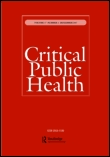
Critical Public Health
Connecting research with real-world health interventions.Critical Public Health is a leading academic journal published by Routledge Journals, Taylor & Francis Ltd, dedicated to advancing the field of public health through rigorous research and critical engagement. Established with the aim of providing a platform for innovative and interdisciplinary scholarship, this journal has cemented its reputation within the Q1 category of Public Health, Environmental, and Occupational Health as of 2023. The journal spans a significant timeline from its inception in 1990 to the present, continuously addressing pressing health issues and the socio-environmental factors influencing public health globally. With an impressive Scopus rank of 144 out of 665 in its category, placing it within the 78th percentile, Critical Public Health serves as an essential resource for researchers, professionals, and students who aim to contribute meaningfully to public health discourse. Although currently not an open-access journal, its rich repository of articles facilitates the dissemination of important research findings, influencing public policy and health interventions worldwide. Based in the United Kingdom, the journal continues to foster a critical perspective on health and wellbeing amid evolving global challenges.
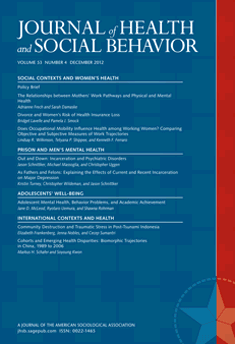
JOURNAL OF HEALTH AND SOCIAL BEHAVIOR
Connecting Research to Real-World Health IssuesThe Journal of Health and Social Behavior, published by SAGE Publications Inc, is a premier scholarly journal established in 1967 that critically examines the interplay between social factors and health outcomes. With a focus on public health, environmental and occupational health, as well as social psychology, this esteemed journal stands out with a 2023 Q1 ranking in both fields and an impressive Scopus ranking of 22nd in Social Psychology and 51st in Public Health, placing it in the top percentiles of academic excellence. Researchers, practitioners, and students alike will find valuable insights through its rigorous peer-reviewed articles, which span a wide array of topics relevant to contemporary societal health issues. While the journal is not open access, it remains a crucial resource for those seeking to deepen their understanding of the social determinants of health and the psychological aspects influencing health behaviors. Based in the United States, at 2455 Teller Rd, Thousand Oaks, CA 91320, the Journal of Health and Social Behavior continues to foster scholarly conversations and advance knowledge in its pivotal fields.

Epidemiologia & Prevenzione
Fostering collaboration in the fight against health challenges.Epidemiologia & Prevenzione is a distinguished journal published by INFERENZE SCARL based in Italy, focused on advancing the fields of epidemiology and public health. Established in 1987, this journal serves as a pivotal platform for researchers, practitioners, and students to disseminate and exchange important findings related to epidemiology, as well as environmental and occupational health. With an HIndex that reflects its growing academic influence, it currently holds a Q3 quartile ranking in both Epidemiology and Public Health, highlighting its relevance in the scientific community. The journal is indexed in Scopus, ranked #368 in the field of Public Health and Environmental and Occupational Health, and #87 in Epidemiology, showcasing its commitment to high-quality research. Although it operates without an open access model, Epidemiologia & Prevenzione remains a vital resource in promoting knowledge and innovation for a healthier society, making it essential reading for anyone invested in these critical areas of study.

Journal of Health and Safety at Work
Shaping the future of occupational health with accessible research.The Journal of Health and Safety at Work, published by the Iranian Occupational Health Association, is a vital resource for researchers, professionals, and students engaged in the fields of occupational health, safety, and environmental management. With an ISSN of 2251-807X and E-ISSN 2383-2088, this Open Access journal has been dedicated to disseminating knowledge since 2012, ensuring that critical research is accessible to a global audience. The journal’s scope encompasses a diverse range of topics including human factors and ergonomics, safety research, and public health, with a focus on enhancing workplace safety and environmental standards. Although currently positioned in the Q4 category across various disciplines within safety and health research, the journal offers a unique platform for emerging studies and innovative practices, making it a significant contributor to the discourse in these fields. The journal's commitment to open access aligns with the growing trend of transparent scholarship, thus facilitating the sharing of vital insights to improve workplace health and safety outcomes. Researchers aiming to publish groundbreaking studies in this pivotal area will find the Journal of Health and Safety at Work an indispensable avenue for advancing knowledge and fostering professional collaboration.
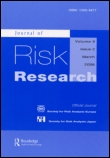
JOURNAL OF RISK RESEARCH
Unraveling the Intricacies of Risk in Real-World ApplicationsJOURNAL OF RISK RESEARCH, published by Routledge Journals, Taylor & Francis Ltd, is a prestigious academic journal dedicated to advancing the understanding of risk across diverse fields, including engineering, safety, social sciences, and management. With its impact reflected in its Q1 quartile rankings in multiple categories and a solid standing in Scopus rankings, this journal serves as an essential resource for researchers, professionals, and students aiming to explore the complexities of risk analysis and its implications in real-world scenarios. The journal has been consistently publishing high-quality research since 1998, contributing to both theoretical frameworks and practical applications. While not open access, the content of the journal is invaluable for those keen on staying at the forefront of risk research. By addressing the multifaceted nature of risk, including safety, reliability, and strategic management, the JOURNAL OF RISK RESEARCH plays a vital role in shaping contemporary discussions and innovations in risk management and decision-making.
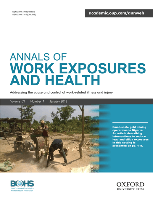
Annals of Work Exposures and Health
Pioneering research on work-related exposures.Annals of Work Exposures and Health, published by Oxford University Press, stands as a leading journal dedicated to the field of public health with a particular focus on environmental and occupational health issues. Since its inception in 2016, the journal has provided a robust platform for disseminating high-quality research, boasting an impressive impact factor that reflects its rigorous peer-review process and significant contribution to advancing knowledge in the field. With its open access model, the journal ensures that critical findings are readily available to researchers, professionals, and students, fostering a collaborative spirit in tackling the challenges associated with work-related health exposures. As of 2023, it ranks in Q2 in its category, positioned within the 69th percentile in Scopus, illustrating its influence and relevance in the ongoing discourse surrounding occupational health. The Annals continues to attract diverse contributions that aim to inform policy and practice, making it an essential resource for anyone involved in public health research and advocacy.
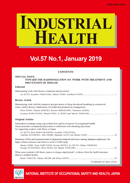
INDUSTRIAL HEALTH
Elevating Standards in Environmental and Occupational HealthINDUSTRIAL HEALTH is a premier journal dedicated to the dissemination of innovative research in the fields of public health, environmental and occupational health, as well as toxicology and mutagenesis. Published by the National Institute of Occupational Safety and Health in Japan, the journal has been a critical resource for over six decades, covering essential topics from 1963 to the present day. With an impressive placement in the second quartile (Q2) of the Public Health, Environmental and Occupational Health category and a third quartile (Q3) in Health, Toxicology, and Mutagenesis, it is recognized for its significant contribution to advancing knowledge and improving practices within the industry. While not an open-access journal, INDUSTRIAL HEALTH offers researchers and students access to a wealth of knowledge through its rich archive of articles, fostering a deeper understanding of health and safety challenges in industrial settings. The journal’s dedication to high-quality research and its strategic role in promoting occupational safety make it an invaluable asset for professionals seeking to enhance health standards and safety protocols worldwide.